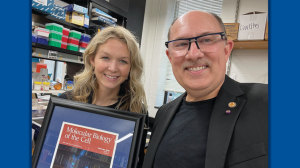Felicia Pagliuca Follows Her Fascination
When Felicia Pagliuca arrived at Duke as a first-year undergraduate student from Asheville, she was only 16, but she was already fascinated by biology and physics. She knew she wanted to do scientific research “someday.”
That fall semester, she learned she didn’t have to wait for someday. Her biology professor, Ron Grunwald, PhD, told her she could start working in a Duke lab right away. “I had no idea it was possible for an undergraduate to participate in research,” she recalled, “especially at a place like Duke.”
With Grunwald’s encouragement, she reached out to a few faculty members doing research she found interesting. She emailed Joseph Heitman, MD, PhD, the James B. Duke Professor and Chair of Molecular Genetics and Microbiology, and he invited her to visit his lab for an interview and a tour.
“It was the most exciting place I could imagine being,” she said. She would have been happy washing beakers and soaking up the atmosphere, but Heitman let her know she could actively participate in research. She was hooked.
“The lab became my second home at Duke,” she said. “As soon as classes were over, I would run over to the medical school and spend as many hours as I could working in the lab until I needed to get dinner and do actual schoolwork.”
Heitman said Pagliuca functioned in the lab more like a graduate student or postdoctoral fellow than an undergraduate. “She is just one of the most delightful people you’ll ever meet,” Heitman said. “Ebullient. Incredibly smart. And very organized.”
One day, when the Trinity College Board of Visitors was on campus to discuss undergraduate research, Pagliuca gave them a presentation about her work in Heitman’s lab. “Felicia just wowed the Board of Visitors,” Heitman said. “At the end of the meeting, many of them wanted to come to work in the lab.”
By the time she graduated from Duke in 2007, Pagliuca had published several articles in peer-reviewed journals, including two as first author and one in the journal Nature as a coauthor. One of the publications featured her research with a photograph on the cover. “It’s a beautiful image,” Heitman said. “It’s a micrograph of a mutant fungus.”
Today, Pagliuca is the vice president and disease area executive for type 1 diabetes at Vertex Pharmaceuticals in Boston, where she is working on a new treatment, perhaps even a cure, for type 1 diabetes. Each step of the way, from mutant fungus to a potentially game-changing diabetes treatment, Pagliuca followed her fascination with science and emerging biotechnologies.
After graduating from Duke in 2007, Pagliuca went to the University of Cambridge as a Marshall Scholar, a move suggested by another Duke mentor, Daniel Lew, who was the James B. Duke Professor of Pharmacology and Cancer Biology at the time. “I thought that would be a fascinating thing to do,” she said. “I had never left the United States at the time.”
It was there, while earning her PhD in biology, that she heard Harvard professor Douglas Melton, PhD, give a talk about his research with pluripotent stem cells, which have the ability to grow into different cell types. “If you figure out the recipe — what genes to turn off and turn on and in what sequence,” she said, “you could coax the pluripotent cells into [becoming] any cell in the body.”
Melton specifically wanted to make pluripotent cells develop into insulin-producing cells that could be used in patients with type 1 diabetes, to release people from an unrelenting daily burden of blood checks and insulin therapy. “That was a lightbulb moment for me,” Pagliuca said, “the idea of using a cell as a kind of living medicine to treat disease.”
Pagliuca had no experience in stem cell biology or diabetes, but she headed to Cambridge, Massachusetts, for a postdoctoral fellowship in Melton’s lab. “I love to learn,” she said. “I love a new challenge.”
And she met the challenge. “She was successful in figuring out a way to differentiate human stem cells into functional [insulin-producing] cells,” Heitman said.
To help bring the new technology to clinical trials, Melton, Pagliuca, and Robert Millman cofounded Semma Therapeutics. In 2019, Semma was acquired by Vertex Pharmaceuticals. In 2021, Vertex launched the first clinical trial of the new technology, an investigational cell therapy for the treatment of type 1 diabetes. The study is still underway, but according to an article in The New York Times, the early results are promising.
Reflecting on her scientific beginnings at Duke, Pagliuca said, “Duke was the place I figured out how to become a scientist. It was inspirational. The mentors I had as an undergraduate — I think they saw things in me I hadn’t yet imagined for myself as a career.”
Now she wants to give back. That’s why she has joined the School of Medicine Board of Visitors. “The School of Medicine was the place that inspired and launched my own career in medical research,” she said, “so any opportunity to be able to support the School of Medicine is exciting to me.”



